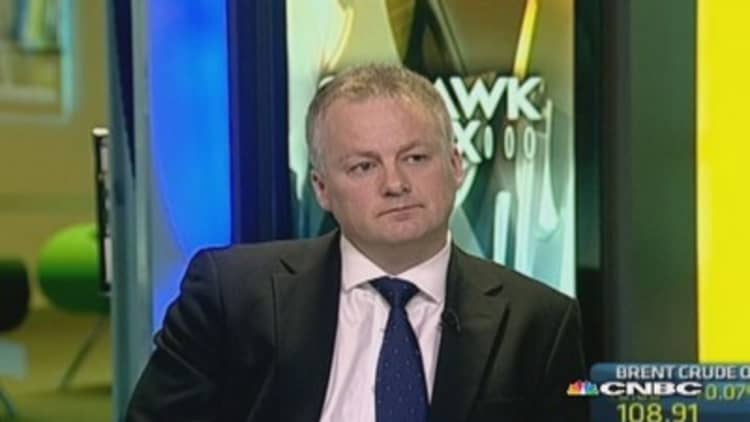Europe and the U.S. both got off to a weak start on Tuesday, with bonds and stocks dropping simultaneously. With all this in the background, traders are asking themselves a big question: will the European Central Bank disappoint at its meeting?
There's lots of speculation on what ECB chief Mario Draghi will say at his Thursday press conference. What's clear is that the market is fully pricing in a multi—step program: rate cuts in the benchmark rate and the deposit rate, Long Term Refinancing Operations (LTRO) that will offer low-cost loans to the banks, and other operations.
The central bank did an LTRO twice before, once in December 2012 and again in February 2013. These were low-cost loans for three years. No info on the new LTRO but it will likely be similar. Also on the table is a purchase program for asset-backed securities (ABS) to free up capital in the balance sheets, so they can package them to the ECB and provide liquidity to the banks.
The big issue is quantitative easing. There is not a uniform bond market there. You have to pick and choose to decide which countries and which banks require the most help.

So they will be buying sovereign debt as well as corporate bonds of some kind, likely on the secondary market. They won't be buying new bonds, since that will be against the ECB charter that prevents them from monetizing the debt of the countries.
The concern is Draghi may not be as bold as some have anticipated. Any deviation from a major program will cause a pullback in markets. The bigger question is, will any of this help growth? Will it improve employment? At the margin, it will help growth a bit, but it's very doubtful any of this will help employment.
1) Alibaba initial public offering still looms. It's been almost one month since Alibaba filed its IPO registration statement in the U.S. (May 6th to be exact). Why is that important? Because it's a month later, and the SEC will typically send comments on the IPO 30 days later, usually asking for additional information.
That communication is private, so we won't see it. However, they will have to update their registration statement shortly, and that is public. That should take about two weeks, so I would guess we will see more information out in mid-June.
However, if there is a lot of questioning from the SEC (my bet is that there will be), it could take longer. In fact, the level of inquiries from regulators is the primary variable in determining when Alibaba goes public. There could be several rounds of "private" communications between the company and the SEC, several rounds of "updates" to the registration statement, before this is over.
That's why it is highly unlikely that we will see the company go public before mid-July at the earliest; August is more likely.
2) Wells Fargo reportedly makes changes in its sector weightings.It upgrades the materials sector to "Overweight" from "Market Weight" on improved chemicals production and an acceleration of buybacks. The bank upgraded the energy sector to "Market Weight" from "Underweight" on improving commodity production. However, it downgraded consumer discretionary on a slower pace of housing activity, and financials based on a flattening yield curve and dampened trading activity.
--By CNBC's Bob Pisani


